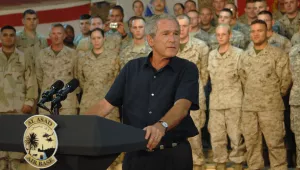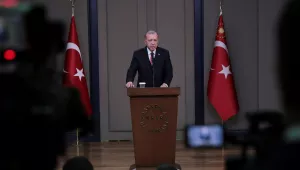I. Introduction: High Stakes for Iraqi Energy
Iraq’s ability to reach its energy potential should be of broad regional and international concern. Iraq could be poised for a dramatic transformation, one in which it finally escapes the political and technical constraints that have kept it producing less than 4 percent of the world’s oil, despite having the third-largest conventional oil reserves in the world. Should Iraq meet its ambitions to bring nearly 10 million more barrels of oil on line by 2017, it would constitute the largest ever capacity increase in the history of the oil industry. Should Iraq, more probably, bring only half this capacity to market, it would still represent a massive achievement.
Translating Iraq’s energy promise into reality is in the shared interest of Iraq, the United States, Japan, and the international community more broadly. At the highest level, the health of Iraq’s energy sector—currently the source of more than 90 percent of revenues accrued by the state—is a major determinant in setting Iraq’s overall trajectory. A booming energy economy is not a guarantee of a prosperous, democratic, and stable Iraq; it could also be the hallmark of an Iraq that has returned to authoritarianism or even tyranny. But it is difficult to imagine a prosperous, democratic, and stable Iraq that does not claim a thriving energy industry among its assets.
More specifically, from an Iraqi perspective, developing and monetizing Iraq’s underground wealth is the cornerstone of a successful development strategy. After more than 30 years of internal conflict, international war, sanctions, and dictatorship, Iraq’s development needs are enormous. Reclaiming Iraq’s position as one of the more advanced economies and societies of the region will require huge investments in infrastructure, health, and education. The government’s ability to successfully make these investments is the key to the consolidation of the new political system Iraq has created since the fall of Saddam Hussein. A failure to deliver across social and economic dimensions will—and has begun to—put Iraq’s fragile democracy under enormous strain. In addition, Iraqis are cognizant that their energy strategy is also their foreign policy strategy and their security strategy. Not only are high revenues needed to build and maintain a military capable of meeting Iraq’s internal and external threats, but Baghdad’s capacity to re-establish itself as a regional power will be in part a measure of its ability to maintain influence with and over its neighbors on account of their energy links to Iraq.
The United States, Japan, and the international community share most of these interests with Iraq, if bringing a slightly different perspective to the situation. This group is invested in Iraqi stability and the consolidation of Iraq’s nascent democracy not only for the benefits it brings to the Iraqi people, but also because it is the foundation of Iraq’s relationships in the international arena. Iraq’s internal institutions will in large part determine Iraq’s external orientation. Particularly now that staunch American allies in the Middle East—such as Hosni Mubarak’s Egypt and Ben Ali’s Tunisia—are gone, the United States should value governments likely to be sympathetic to its needs and interests in the region more broadly. Although today’s Iraq is neither inclined nor able to carry American water in the region at this time, it is certainly more likely to be in broad alignment with the United States in the future than any resurgent authoritarian regime in Baghdad would be.
Similarly, Iraq’s stability has major implications for regional stability. Literally sitting on the seams of the Middle East, Iraq embraces nearly every fault line of the region. Its ethnic, sectarian, linguistic, and religious diversity—in combination with its natural resources, robust population, and sheer size—has led every regional power to see its interests as caught up in Iraq’s destiny and has justified a wide variety of external interventions by Iraq’s neighbors. A fractious Iraq, with uncertain politics and fragile institutions, will instigate more instability throughout the region. While this connection between Iraq and the region is well understood, what may be less appreciated is Iraq’s ability to stabilize the region. As revolutions unseat longstanding dictators, few have had time to consider what economic model will alleviate the economic deprivation and frustration that drove many of the recent protests. Unlikely to compete with China’s ability to serve as the factory of the world, Middle Eastern nations will need to seek greater economic gains through regional integration. Iraq, given its geographic location, its historical role as a regional leader, and its energy wealth, could be a prime driver of such integration—if it can realize the potential of its oil and gas deposits.
Finally, the international community—particularly large energy consuming countries like the United States, China and Japan—has a major interest in Iraq reaching its energy potential because of the implications of Iraq’s success or failure in this realm for energy security. The global recession and accompanying decrease in demand for energy in 2009 and much of 2010 removed concerns over limited spare oil capacity from the forefront of many minds. The new turbulence in the Middle East and the resumption of global energy demand at the end of 2010, however, should remind us that the current spare capacity in the global system is finite. Decisions to further expand capacity have largely been put on hold as producing countries seek to gauge the trajectory of international demand; talk of a “demand peak” due to concerns over climate and the environment as well as economic uncertainties have made countries such as Saudi Arabia reluctant to build more spare capacity.
As a result, the international community is very likely to be reliant on Iraq (and Saudi Arabia) to bring more oil to international markets in the coming years if the world is to avert another supply crunch like that which occurred in 2008. The severity and timing of such a crisis is dependent on a wide variety of factors, such as the growth of Chinese demand and whether Iran remains subject to international sanctions over the long term. But the projections of many companies and international agencies include Iraq bringing substantial quantities of oil to international markets in the coming years. The International Energy Agency envisions Iraq bringing on line an additional 3.6 million barrels a day (b/d) of oil to what it currently produces; BP similarly sees Iraq producing 5.5 million b/d in total by 2030. The inability of Iraq to bring these significant quantities of oil on line in the coming years diminishes the prospect of the world meeting global energy demand at a reasonable price and increases the possibility of another global economic crisis.
- For the full report of "Iraqi Politics And Implications For Oil And Energy" download here (5.3 MB PDF)
This report was written under the auspices of the Geopolitics of Energy Project at Harvard Kennedy School's Belfer Center for Science and International Affairs and as a specific contribution to a project at the James A. Baker III Institute for Public Policy at Rice University. That project, titled "The Future of Iraq: Implications for World Oil Markets," examines how Iraq’s oil and natural gas policies and other developments will affect global markets. It is available here>
The author is grateful for the support of BP, the Dubai Initiative, the Baker Institute, and the Institute for Energy Economics in Japan.
O'Sullivan, Meghan. “Iraqi Politics And Implications For Oil And Energy.” Belfer Center for Science and International Affairs, Harvard Kennedy School, July 2011





